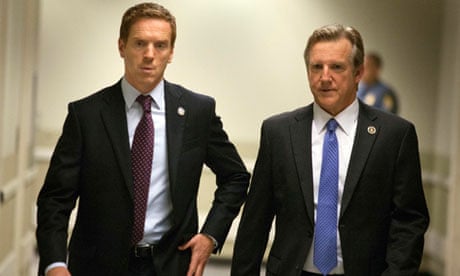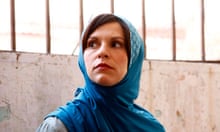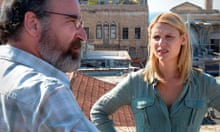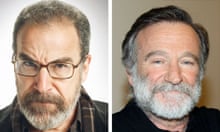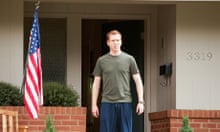Before I begin: a caveat. I know television drama is often fanciful and ridiculous. The West Country of Midsomer Murders would be the murder capital of Europe if you took it at face value; the London of Spooks a place of endless shootings, conspiracies and car chases.
But fictional drama tells us truths about ourselves in ways that can be as uncomfortable as they are unintended. The Emmy-winning Homeland on Channel 4 is a case in point. Its plotting is as ridiculous as it is exciting. But what makes it difficult to watch is its treatment of Muslims.
In the first episode of the new season we were confronted with a new character, a glamorous correspondent with a cutglass English accent, a Palestinian family and access to both the CIA and the US Congress. Like the Saudi prince from the last series and the academic, behind the scenes these high-profile Muslims living in the US share a secret: both willingly or otherwise they are covert helpers of Abu Nasir, the al-Qaida terrorist leader.
In other words, it does not matter whether they are rich, smart, discreetly enjoying a western lifestyle or attractive: all are to be suspected.
I admit I have no idea how the story arcs in Homeland will develop and what surprises are in store. What I do know is how both Arabs and Islamists have been portrayed thus far as violent fanatics, some of whom are powerful and influential infiltrators.
As someone who has spent much time in the Middle East, I find the depictions not only crude and childish but offensive. There is more to it than the portrayal of individuals. For Homeland presents an odd and unbelievable image of relationships between countries and identities in the region, where Palestinians, Iraqis, Saudis all share an agenda regardless of background, culture and history.
Should any of this matter in a fictional series? The answer is yes.
It has not only been Damian Lewis, the British actor who plays the character Brody, who has insisted that its appeal is that its "action is grounded in a political reality". Reviewers have also praised the "credibility" of a programme whose fans include the president of the United States.
The reality is that what Homeland portrays is a peculiar view of the Islamic world, one rooted, perhaps, in its genesis as an Israeli drama, where the view of the surrounding neighbourhood is more paranoid and defensive. It matters for this reason. Popular culture both informs and echoes our prejudices.
How we portray the "other" – those whom we fear or are suspicious of – reinforces cultures of conflict. In some respects it has always been thus. The author and journalist Robert Winder detailed in his book Bloody Foreigners how Charles Dickens, in creating the character of Fagin for Oliver Twist, refashioned a real social problem. The boys' "rookeries" were run by Italian gangmasters in Clerkenwell's Little Italy, but in keeping with contemporary suspicion and hostility to Jews Dickens made Fagin Jewish – something he later regretted.
Indeed, popular literature, plays, films and television have often been crude in their representation of perceived enemies – Jews, Germans, communists, Irish "terrorists" and now Muslims, amplifying concerns that may be based in some reality like the phenomenon of al-Qaida terrorism to represent it as some vague, universal truth.
In some respects the negative portrayal of Arabs in US film and TV dramas is not a new phenomenon, as documented by academic Jack Shaheen in his studies The TV Arab and Reel Bad Arabs where he has argued that historically Arabs in US dramas have, since the 1920s, been depicted as being one of the "three Bs… bombers, belly dancers or billionaires".
The impact of television portrayals on perceptions of minorities is not a new issue. In the 1970s – in the aftermath of the US civil rights movement – there was sufficient concern for a presidentially appointed commission to study it. The subsequent report suggested strongly, as suspected, that both the "invisibility" of minority presentations on television as well as how minorities were portrayed when they did appear – for example, as criminal or lazy – did influence the way both whites and non-whites see minorities.
Research conducted by social scientists in the 1990s in the US examined how exposure to fictional portrayals of both stereotypes and counter-stereotypes influenced how credibly a study group of 400 students believed real and high-profile cases then in the news.
"[Exposure] to a stereotypic portrayal of a female," wrote researcher Sheila Murphy in The Impact of Factual Versus Fictional Media Portrayals on Cultural Stereotypes, "led individuals to doubt the credibility of Anita Hill (the woman who accused supreme court nominee Clarence Thomas of sexual harassment) and Patricia Bowman (the woman who accused William Kennedy Smith of rape), whereas exposure to a counter-stereotypical portrayal increased the perceived credibility of these women".
While many have pointed to the extraordinary success of The Cosby Show as a turning point in TV depiction of minorities, a study by Dana Mastro and Bradley Greenberg in 2000 into racial stereotyping on TV discovered that inherent biases continued, with only 3% of characters being black, and that of the three groups examined – Caucasian, Latino and African American – African Americans continued to be the most negatively stereotyped – representation and attitudes that barely changed almost a decade later when the exercise was repeated.
Indeed, when there are inherent biases in the way that TV portrays groups and individuals – as in Homeland – they seem to reflect widespread and widely held attitudes.
Stuart Hall, the cultural theorist who has examined the phenomenon of "reception theory" as applied to televisual media – building on the work of Hans Robert Jauss in the late 1960s – has argued, indeed, that the messages in television drama "intersect with the deep semantic codes of a culture and take on additional, more active ideological dimensions".
In other words, television drama such as Homeland not only reflects cultural and social anxieties at any given time, it reflects back those anxieties, reinforcing and shaping them. Crucially there is strong evidence that counter-stereotypical fictional depictions in popular culture may have a positive impact, with some arguing that it can help turn around prejudicial attitudes.
What is intriguing is that Homeland seems out of step with trends in characterisation post-9/11, in US TV and film at least. After a period when – as even Howard Gordon, the executive producer of 24, admitted in 2009 – the trend for depicting Muslims as terrorists seemed to be in decline, it sticks out like a sore thumb.
Then, Howard described the reason for that change at least in terms of his own show's development, not least as public attitudes began to alter in the wake of the Abu Ghraib abuse scandal in Iraq. "We began to realise," he said in remarks to Souheila al-Jadda, co-producer of the American TV series Who Speaks for Islam?, "that by portraying Muslims strictly as terrorists on the show we were... unwittingly exploiting some of the fears of our audience members." He added: "I think that the impact of our content or creative content is one of our greatest exports. It becomes a very powerful instrument for understanding each other in this terrible... divide we find ourselves in with the Muslim world."
That coincided, too, with emerging criticism from both Muslim advocacy groups in the US over depiction of Muslims in drama as well as the refusal by actors to play "sinister" Arabs.
Perhaps, in the end, Homeland will surprise and conclude with a more challenging and nuanced picture of Islam and the Arab world that goes beyond the stereotypes.
I am not holding my breath.
